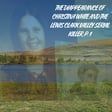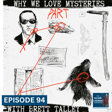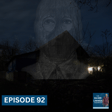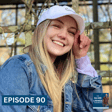Corruption in Suffolk County and its Impact on Investigations
00:00:00
Speaker
I think it would have been arrested 10 years ago. Absolutely. it It was corruption within Suffolk County between the district attorney and and the the police chief. I think that was a the absolute brick wall that pushed out the FBI, that subverted anybody caring. Dominic Verone, the initial lead investigator on the case, was tossed out and, you know,
00:00:27
Speaker
sort of threatened without his pension or whatever. And I think it was all just to protect the corruption going on between James Burke, former police committee police chief, and and Thomas Spoda, the district attorney.
Introducing the Long Island Serial Killer Case
00:00:43
Speaker
And they would just hide in their own dirty laundry, but they they were willing to do that at the expense of allowing a serial killer to continue to be a predator on the island.
00:00:54
Speaker
That's Raoul Montero, a researcher, advocate, and journalist who's known online as CatchLisk. This is the Silver Linings Handbook podcast. I'm Jason Blair.
00:01:21
Speaker
Ralph Montero, who grew up on Long Island, spent many years privately researching the Long Island serial killer case after four victims were found on Gilgo Beach in 2010.
Building Community Around Victims and Families
00:01:33
Speaker
Now, at least 11 or more, depending on how you count it, victims have been identified in the killings, and Rex Heurman, a Long Island architect, has been arrested as a suspect in the case.
00:01:46
Speaker
This is the second episode in our conversation with Rao. During his research on the case, Rao searched for ethical, transparent, and accurate advocates and researchers online who were looking into the case. It has built a community that's really dedicated to identifying missing or murdered marginalized victims, some of whom were connected to the Long Island Zero case, and some who were not.
00:02:11
Speaker
Rowell has also developed deep relationships with some of the loved ones of the victims.
Correcting Misconceptions and Identifying Marginalized Victims
00:02:16
Speaker
Over time, he's become frustrated with many of the inaccuracies that have become common beliefs about this case and others, and dedicated himself to setting the record straight. One of the things Rowell has done is built an amazing map of missing persons cases across the country.
00:02:34
Speaker
Raoul maintains that database online and is working his way through state by state. What he's collected includes way more than what the federal government actually holds on to in their database called NamUs. Today, in the second part of our discussion, we're gonna discuss the murders and we're also gonna discuss the case, but we're also gonna spend some time talking about missing individuals across the country, many of whom were marginalized and don't get enough attention.
Biases Affecting Perception and Response to Marginalized Victims
00:03:22
Speaker
Well, I think there's a, in my mind, just putting my reporter hat on, I think there's a slightly different equation if I'm sort of like the killer. And it's not so much that their family doesn't care about them, but the family is not going to have the juice to get the attention um to get and or the political influence. Or more importantly, that when people hear the word sex worker, I know you mentioned sex worker or survival worker because there are people who are doing it for their survival and there are people who do it because they enjoy it.
00:04:01
Speaker
And when they hear the word sex worker, it breaks it breaks the narrative. And i I even in a case like Brianna Maitland, where you have a middle class girl in Vermont, the moment someone suggested, which we don't really even have much evidence for, that she was involved in drug use attention. Absolutely. And and that's a systemic problem.
00:04:28
Speaker
it's It's a generational problem. It is embedded in our collective mindset as Americans.
Challenging Stereotypes in Serial Killer Profiles
00:04:36
Speaker
It is what it is. It's it's terrible. I think with the Long Island serial killer, I think Lisk is an absolutely sexually driven, deviant,
00:04:48
Speaker
Whereas it's more than just the need to have sex. That in and of itself can be innocuous as long as it's consensual and nonviolent. I think when it came to Lisk, it encompassed so much more. And I think with him, his preferences were varied and they changed almost like
00:05:14
Speaker
Sampling something new, as disgusting as that sounds, that it sounds even it feels even more disgusting to say it, um which is why you have um a spectrum of classifications on Ocean Parkway. You have peaches who's African American, you have Asian dough. We don't know how they identified themselves, but they were found in women's clothing. So they could be gay, they could be trans or or preparing for trans. You have the other five that are
00:05:49
Speaker
5'2", 110 pounds. For me, I keyed into the Hazel Eyes. On my map, i make even to this day, it could have probably most likely may not have anything to do with Lisk, but Hazel Eyes is a thing for me and I'll make then ah ah a Hazel Green icon for it. I think the Hazel Eyes means something to him. I still believe
Adapting Methods: Debunking Consistency Myths in Serial Killing
00:06:10
Speaker
that. He has Hazel Eyes. His daughter has Hazel Eyes.
00:06:13
Speaker
So I think there's there's there's a catalyst to that. But you know then there's there's ah a wide variety of possible Sugar Bear, who's 6'5", African American, a drag artist. And I think Lisk was trying everything, he was unable to continue to get away with it. He wasn't being caught. There was no heat on him until 2020. Well, I also think that there is a misconception about serial killers that people have. And I think one of the misconceptions people have is that they have the same type. And I think some of that misconception comes from like,
00:06:58
Speaker
a self-defensive thing that we have where we want to say we're not the type of fill in the blank. But the reality is like you find a lot of variety. Israel Keys is an example, even to have Bundy, even though he had a predominant type. um type yeah yeah um but He was very opportunistic and that yeah that's the other thing.
00:07:19
Speaker
And and I think, too, it's just like every other human being on the planet, like we have varying degrees for variety and the things that we like. And that's not just the sexual thing. But I think the thing that's hard for people is that, oh, these people are like a lot more like us than we think they are.
00:07:36
Speaker
Well, I think our biggest mistake as a rational society is to believe that serial killers exist within our square box of rationality. They do not.
Comparing Methods of Notorious Serial Killers
00:07:53
Speaker
That's why anyone who sits there and says MOs don't change, I can't engage with because I can prove it out of just 10 serial killers off the top of my head. but then nice Signatures don't change. well Signatures do change. They can change as often as ah an MO. and Signatures are the stuff of Hollywood. you you Very rare do you get a signature and a serial killer.
00:08:18
Speaker
Yeah, and just defining the difference. An MO is your modus operandi. It's the things that you do to get away with the crime. Yep. Signature may be a unique thing that you do that is not necessary to commit the crime, right? um And it's more of a a ritual for you. And I think that's a misconception a lot of people have that MO is stable.
00:08:41
Speaker
It's not. It's based on efficiency. It's based on you know circumstance. you know Where are people? Where am I? you know What's going on in the news these days? What technology exists out there? so Inevitably, MO is going to change. If you're smart, over time is going to develop. And and we certainly certainly see in this case that you know there are clearly some victims who are dismembered. I'm sure that served a purpose. There are clearly some victims who are not dismembered. But I think you know one of the things people had a difficult time with in the beginning, and I know some folks in the FBI who worked on the case in the second phase of the FBI being there, but one of the things that one person from the FBI told me was that
00:09:32
Speaker
Some people in law enforcement had a real time, hard time wrapping their head around, you know, they could collect, they could connect the four, the giglow four, because they were, you know, found near each other, they were in burlap sacks, they were strangled.
00:09:50
Speaker
um You know, the dismemberments, you know, may have been in multiple locations, didn't have burlap sack, you know, there wasn't always a sack. And they were saying some of the law enforcement were having a hard time wrapping their head around the possibility that it could be Um, the same killer, but killers like the rest of us change our behavior. I changed my commute because traffic is different. I, you know, all of these different things today. I want vanilla ice cream tomorrow. I want strawberry. Um, and so I think people have a hard time wrapping their heads around those.
00:10:27
Speaker
but thank you But there are commonalities between the victims he chose, right? Absolutely. Yeah. I mean, you look at just the GILGO4, Maureen, Melissa, Megan, and Amber, five to anywhere from 411 to 5253, 110 on average, but they all had hazel, bluish, green eyes. And then you look at, and they were just in intact.
00:10:52
Speaker
And then you look at- All were in the sex trade too. Yeah. Then you look at Valerie Mac and Jessica Taylor, who were dismembered, but they also had the same physical characteristics, especially the eyes. And then you start to go, you know, it's, well, people would say, well, it's dismemberment versus disposal intact and it's two serial killers. Well, no. And and I don't mind having, you know, an intellectual nuanced conversation about it, but
00:11:26
Speaker
and MO changes signatures. He's only a handful of experts on Richard Conningham, and even those experts can tell you there is no signature. who is coning him Richard Conningham is the Times Square torso killer who has pretty much admitted to about 100 murders, although he's not in he's not been convicted of that many.
00:11:51
Speaker
seventeen ah No, that's Rifkin. um Less than that. But Coddingham changed his MO all the time. Coddingham was opportunistic. Coddingham will drive
Speculating on the Victim Count of LISK
00:12:01
Speaker
through you know a town in New Jersey and chat up a housewife and kill her. He was incredibly opportunistic, but he was also viciously violent.
00:12:14
Speaker
Um, but there's still no signature for Coddingham. He's strangled. He stabbed. He blunt force trauma. He beheaded. He set fire. He's he's it's probably more of a factor of, you know, not just getting away, but also, you know, personality, right? It's personality. It's time and circumstance. Coddingham was in the 70s. Well, according to him, late 60s, 70s and 80s.
00:12:43
Speaker
um He went to jail in 1980. Rifkin had a particular type, an MO for the most part, and a sloppy, disorganized killer. Richard Shulman had a particular type. He would pick up sex workers. Shulman lived in Long Beach, Long Island.
00:13:03
Speaker
um He was a postal worker in New York City. He picked up um sex workers and Yonkers um and would discard them. And and then you have Lisk who outlived them all.
00:13:21
Speaker
um had a in my opinion had an awareness of all of everyone that came before him and I and I validate or justify that by Saying the only letter he ever responded to in jail was to the smiley face killer a happy face killer um keith jefferson jessperson, so he had an awareness of his peers. and and And that this is certainly my opinion. who You're saying that is the only person the human responded to. Yep. Was the happy face killer. wow I mean, yeah he may have responded to his family and stuff that I don't know, but I'd never heard that before. Yeah, that letter came out um and I had it validated, of course, um by um the podcaster who put it out there.
00:14:11
Speaker
and it's legit it's been validated it's ah it's out there as public knowledge and' na ah Well, this is where my hashtag no butter for Rex came from because Rex was complaining about not having butter for his bread in jail. Poor thing. Sort of the least of my worries. Exactly. And I found it all just, you know, confounding because if you're you're saying you're innocent, I guess you can complain about no butter in jail. But the only person you reply to is a serial killer.
00:14:47
Speaker
I mean, that's that's that's just a conundrum for me. But but that just to me shows how self aware he was of himself. and And that's also validated in the the most recent superseding bail document, because he had an awareness. He had an awareness of what he's drawn. Douglas is John Douglas's book. Yes. And he also had an awareness of of missed opportunities or not as perfect um executions of his prior yeah I mean, he talked about next time I should do X or Y. I'm curious, i you know, having the relationship with the victim's family is studying the case, looking into other cases. There are two things I wanted to ask you. How far do you think these go back?
00:15:36
Speaker
And if you're comfortable speculating, how high do you think the really three things the number could be? And what do you think we can do to because I have a feeling it's going to be a shocking number. What do you think we can do to better protect marginalized victims?
00:15:55
Speaker
So I'll say the last question for less, because that's the powerhouse question. um i think is I personally believe he escalated to murdering human beings um in the early 80s, which puts him it could it could put him as young as 18 years old. it's It's earlier than the FBI standard of 25.
00:16:20
Speaker
um but Sandra Castilla in 93 puts him at 23 years old, 65, 75, 85, 95, about 27 years old, 28 years old, which is right there in the prime spectrum of, yeah know according to the FBI, of of when serial killers escalate to human murder.
00:16:44
Speaker
um I believe that there's more than that. I believe Judith Ramona Velaz, who is five foot two, hazel eyes, strawberry blonde hair, also in 93, last seen on 10th Avenue, 11th Avenue, 30th Street, um miles a mile away barely from his office in 93. I believe she's a Liz
Removing Stigmas and Recognizing Victims' Humanity
00:17:09
Speaker
victim. And as far as a count,
00:17:16
Speaker
I think a for me, I think a modest account is 60 plus. Modest. Modest. Modest would 60. I personally put them at ah about 100, 100 plus. I think there's enough to go through.
00:17:36
Speaker
Uh, and I've documented it all i'm on like my possibles list and my recs timeline database Uh, and they're all there and and there are reasons why I believe and certainly Many of them can be crossed out or overlap with you know domestic violence or happenstance, which is such a cruel way to say it, um but I think there's something there there. you know Wherever someone is on my possibles list, there's a location for Rex Uriman, not far away. That's frightening. And that is what's frightening. you know that That's what keeps me up at night often. And as far as what can be done,
00:18:25
Speaker
I think that's such a bigger question that deserves a whole lot more time to really discuss with not only myself, but you know many other people that are even more nuanced than I am. But I think the first thing we need to do is remove stigmas. like Remove all the stigmas. Stop dehumanizing people for their race, their religion, their occupation, their social status.
00:18:52
Speaker
um I think when it comes to sex workers, stop using the word prostitute and hooker. like It's crude. and And because you're from a generation where that was the word,
00:19:07
Speaker
It doesn't give you a feeling. You know what it reminds me of? It reminds me of when my dad was in Vietnam, this drove him crazy. There were all sorts of phrases that they would that the soldiers would use for Vietnamese. yeah I'm not going to repeat them right now, but they're a common part of dialect still, which is frightening. yeah um But they would use them. And my dad said, well, the purpose was to dehumanize them so it made it easier to kill them. And I feel like we dehumanize people, you know um like words for black people, words for Native Americans, words for people who are in sex work. I'm sure people can think of many of those words, which I don't want to
00:19:55
Speaker
say, but it makes it easier to look away. Exactly. That is happening to them, whether it's they're not able to get housing, they don't have water or they don't. Well, that's why it's so important.
00:20:09
Speaker
And I get ridiculed on this every once in a while recently, in fact, you know say their names.
Empathy and Advocacy for All Victims
00:20:16
Speaker
That's why we say say their names because it's more than saying that any victim is a a mother, a daughter, a niece, a sister, whatever. That victim is who they are. that They are them too. you know We can sit there and say, you know ah Maureen is a mom, Maureen's a sister, Maureen is a daughter, Maureen's a sister-in-law, a niece, a cousin, but maure is Maureen is She's a human. yeah Maureen belongs to Maureen and her family. Jessica belongs to Jessica and her family. Shannon belongs to Shannon and her family. As committed as I am to all of them,
00:21:04
Speaker
They don't, to me, they they hold a place in my heart, but I'm slightly. dispute that because I would say that in the ideal world, they all belong to all of us because they are humans like us. But where I feel like that's not necessarily the case is when people dehumanize them or try to take advantage of them or other things like that. But in the perfect world, in the perfect world, they would all belong to us that I would feel
00:21:35
Speaker
like you talked about before crying at the movie that I would feel that same sadness when I think of Valerie Mac or Jessica Taylor because something and I really believe this and I think that's part of the reason why i I talk about or have conversations with people in these cases, I feel like every time we lose ah Jessica Taylor or we lose even Brianna or we lose a well-known case like Abby Williams and Libby Germain out in the Delphi murders or we lose people
00:22:10
Speaker
you know, like Melissa Montoya, we had one of her friends, she was lost in the Navajo ah reservation. And for 23 years, there wasn't an article written about it until this year. And
00:22:29
Speaker
we We all lose something because humans are so unique and we lose something so special when anyone leaves us because it cannot be created. There will never be another. um And so I agree with you. There is a special place for the families, but I think we should feel that sense of loss when someone is unfairly taken away.
00:22:52
Speaker
I mean, I know I feel it. I'm often chastised by, you know, critics for, you know, being too emotional, too drawn to to to any of them. And all I can say is so. I think it's possible to love somebody you've never met.
00:23:15
Speaker
Yeah, I care very much for for all of them. I care very much for um any of the missing people that I work with, with their families. like i care I care an incredible amount for them.
00:23:33
Speaker
When Liszt was arrested was probably the last time I did a full grocery shopping because i'm I'm a little bit bougie and I like a full stock of nice things and I haven't really done that. I haven't done any of that since then.
00:23:54
Speaker
and And I'm not crying martyrdom, I'm not. I have a little belly so I'm clearly eating, but um it changed everything. And I just want- Can I ask a question about that? Yeah. Do you believe, and I know in the last two years they had an intense search and identified him, do you believe that law enforcement treated these cases the same they way they would have if these were people from middle class families. Part of the reason where my question is coming from is almost a deeper place than the cliche because I remember when I was in New York
00:24:37
Speaker
Jonathan Levine, who is a teacher, um was killed, we ultimately found out, by one of his students. And I was in the p police shack, which is on the second floor of NYPD headquarters, and it's where all the reporters were. And I remember getting the call.
00:24:55
Speaker
from somebody in the Deputy Commissioner for Public Information's office who said, we have a real red ball. And what he meant was this was going to be politically on fire and that they needed to sort of solve this very, very quickly.
00:25:11
Speaker
um And i you don't hear that about every case. There is a clear, when it comes to the police department, there is a clear ranking. yeah And you know I talk about this often being out on a crime scene and the detectives saying to me, there were, and I ate, or wasn't, NHI, which meant no humans evolved.
00:25:35
Speaker
And like in that example, it was actually a sex worker who was transsexual and whoever their killer was, which they did. And but what you look at the list case from the beginning, you know, you had the generational ignorance. I'll really give it that nice of a stamp of, of Dormer and Verone.
00:25:58
Speaker
basically saying to the public, Dormer was the police commissioner and Dominic Veron was the lead investigator in the initial onset of the LIS case, ah where they said to the public, you don't have to worry. These were sex workers, basically, I'm paraphrasing, that the the line of work that they were in is sort of the reason why they were murdered. Does that mean you don't have to worry? this yeah your daughter's just saved not on and right Your daughters are safe if they're not sex workers, basically. um And it can be a rubber stamp to a generational dialect, but it's still insensitive.
00:26:43
Speaker
And that has permeated the entire case ever since. Shannon was not only a sex worker, an escort, but she had bipolar. like All these labels started being stamped upon these victims, and and you know it just meant that your average daughter, white girl, blonde hair, blue eyes, is safe. Well, they're really not.
00:27:13
Speaker
And no, no, no, no, not by any stretch of the imagination, because if you listen to the stories of some of these girls, they are your average daughter who ended up. That's why I think like your your episode with um Nicole Petito was so profound because both Nicole and Joe through their foundation, really devote time, attention, empathy, love, care, and money to bringing awareness to more more marginalized people, biracial people of color, indigenous, everyone that is physically appearing, the antithesis of what Gabby Petito was.
00:28:09
Speaker
and Their ability To take every missing person in their perspective is gabby is profound and beautiful and people don't see it for the pure beauty that Their intention is so i've i've i've spoken with joe on a twitter space once about a year or so ago and his commitment to enhancing the public's awareness and getting as much attention, if possible, that Gabby had gotten to any other marginalized person, he would do that all day and night. The foundation would do that all day and night. And and that is what is needed, too.
Extending Empathy to Victims' Families, Including Suspects'
00:28:57
Speaker
like Society has to stop thinking that and it this is going to come out really
00:29:04
Speaker
polarizing, but society's got to stop thinking that only white, blue haired, blonde people matter because all people matter. Well, if there is this moment. And well, and I think there's a natural human tendency to like people who look like me. Yeah. I worry more about. But like even in a recent episode with um Kristen Middleman. Yeah. Yeah. Who's the co-founder of Mars from author, which is the DNA and forensic genealogy um company. And she said something that took me aback because part of the reason why I wanted to have her on, I had seen her in another interview where she answered one question about why they do what they do. And she said to me both, I think in the episode and then privately before,
00:29:55
Speaker
We're not doing our job as an author until there is equity for everyone. And I thought that was such a powerful thing. I wanted to ask you, you said this would be controversial. This will be controversial. um I wanted to ask you, so I made a donation um to the wife and children of Rex Huerman because I viewed them as victims as well.
00:30:19
Speaker
And you know afterwards there was an uproar made in the New York Daily News, New York Post. I got a lot of crap about it, not that I care because you know I don't care, I do what I do. um And you know it did cause my behavior to change because I think what some people don't know is I also afterwards made donations to some of the victims families, but I did it anonymously because I was like, I can read the New York Post headline where they're going to say I was making these donations because I got crap about that. Right. So, hey, New York Post, guess what? Did that too. um And I wanted to ask you, like, do you also consider whether it's Herman's family or others like that? um
00:31:03
Speaker
ah Think of Kerry Rawson, who's Dennis Rader, the BTK killer's daughter. you Do you consider them victims as well? So before Rex was arrested last July, um around last February, I began to um have a friendship with Kerry and I have profound respect for Carrie. Like I admire her so much. She's helped enhance my awareness. She's helped enhance my humanity. Do you know the first person I messaged about Victoria Herman? That's the first person I thought of too. yeah I sent a message to Carrie and her dad. I don't know what to do to help, but hey.
00:31:55
Speaker
i because i um I admin a Facebook group and I have my own Twitter, which wasn't as big then as it is now. And I was a mod in another group and I had relatively respectful standing in other groups. I felt it was important that as a community, we don't attack Rex's family.
00:32:24
Speaker
I felt it was important to state clearly that Asa, Victoria and Christopher were victims. Certainly not victims that lost their lives, but victims nonetheless. And I made sure that in in those groups that standard was respected.
00:32:53
Speaker
I allowed people to voice a dissenting opinion, but I would never allow it to get out of control. I would give warnings, and a few times I've had to remove people.
00:33:08
Speaker
um I wanted to extend that empathy. I wanted to be, for me, a more equitable human being, a more equitable advocate, and give them that respect.
Challenges in Providing Equitable Empathy
00:33:25
Speaker
I had a coworker that I worked with a couple of years ago. And, you know, this eventually caused her to leave her job. The anxiety was enormous, but she had found that her brother-in-law had been arrested by the FBI for child sexual abuse materials. um I've met plenty of people who have found themselves in similar situations and certainly I've probably spoken to hundreds of family members in the hours after they found out that their son, brother, whoever was just arrested for murder. And
00:34:07
Speaker
You know, like I had a job to do, but man, it was so hard to sit in that mom's um living room. I remember one in Brooklyn in particular where I had her son's rap sheet in my back pocket and she was telling me about him and I didn't realize that the police had not told her yet that he was arrested. And man, we were all crying by that and one. um But I think sometimes we can just be so selective in our empathy and have such a difficult time putting ourselves in other people's shoes. i don't Yes, I absolutely agree with you on that. And I think to drill down a little bit deeper, equitable in our empathy, but I also think that people are selective in their anger.
00:35:01
Speaker
And I think that is a bit of a problem in this case because you see these factions now where there's hair evidence on almost all of the victims from you know family members, ex-partners,
00:35:26
Speaker
And the conspiracy theorists go bananas thinking that they're a part of it. I don't have a lot of the hair, but my hair is probably in a house that I don't live in anymore because I go and visit my kids every once in a while. Oh, no, no doubt. I mean, I've been on several trips where recently where I found like long women's hair on my shirts and I'm like, that's not me. So I mean, when my daughter comes to visit and sleeps in my bed while I'm on the sofa, I'll find her hair in my room for a year later. It's just ridiculous. And I think people want to be angry at something.
00:36:11
Speaker
Or someone and they want to target. Yeah. And when they but that's what I don't understand. You have a target. He's six, five, 250 pounds sitting in a Suffolk County jail. There's your target. Like the family isn't it. I now I'll go a little bit further. I do believe that they're victims until charges are laid. I I do believe that they and I still say this um
00:36:42
Speaker
lacked enough awareness to really empathize with the victims and the families that lost someone. And I also think that can be shock sometimes. Yes. And and that's what Kerry and I have had. And also sometimes having bad advisors. Agreed. Kerry and I have had numerous conversations off the record about this, which is why when um a podcast, a YouTuber, Jay, the shaming of Jay, asked if Kerry and I would be willing to go on their show and discuss this, where Kerry can represent the family of Rex, and I'm going to sort of, because I don't speak for any of the family members, but I can sort of handle this side. So we were sort of saying it, my lane, your lane, even though
00:37:40
Speaker
between each other, Carrie and I, we weren't in separate lanes, we were on the same highway. And it's just a different perspective and profound respect between the two of us for each other. And and we learn from each other, we share things with each other.
Improving Media and Law Enforcement Practices
00:37:58
Speaker
And that's what's missing in the the said general,
00:38:05
Speaker
unnuanced public. That's controversial, I know. My friends joke with me that um my empathy extends to people I'm shooting arrows at. um And I think that there's some truth to that idea. like For me, you could make me as mad as humanly possible. um you know You could be dangerous to a group of people, and I may have to do something to step in. I'll still have empathy for you as a human being. And I think it makes, at least my world,
00:38:36
Speaker
I'm a better place. So one of the guests that I had on earlier this year, he was named Monte Frank and he was a member of an Ojibwe tribe in Minnesota. His daughter, Nada, um at 16 years old, it was in 2013, I think she was sex trafficked. And eventually, you know, she came home, started to rebuild her life. And in 2021, her boyfriend murdered her.
00:39:05
Speaker
And, you know, the Bureau of Indian Affairs, which is a US government agency that's a part of the Department of Interior, it says that in Native communities are probably about 4,500 missing persons cases, and they face this much higher rate of violence than others in the population. I use this as an example because you can see similar things in Hispanic communities, black communities. Part of the reason why I use this as an example, because I think they're even more marginalized, and agreed more marginalized. People just don't care. I have said this 100 times. If I talk about missing murdered indigenous people, my download numbers drop and I was telling my Patreon members today that I will ride that into the grave.
00:39:55
Speaker
um you know Very few articles are written about these stories. People tend to ignore the victims. I wanted to ask you before we take ah questions, what do you think we can do from a media perspective, from being the average citizen, um to put the pressure on or to incentivize people to cover and do something about these cases that don't involve blonde hair, blue eye, white one. I think it's a multifaceted problem and the solutions are even more multifaceted. From a law enforcement perspective, I think there needs to be a lot of standardization
00:40:46
Speaker
I think there has to be, first and foremost, empathy extended to whoever's attempting to report a missing loved one. Do you mean standardization in terms of the process? Process. Yeah, yeah I think empathy, for one, I think they have to immediately accept and put out a missing person's report. If it costs you an hour of sitting in front of a computer, then so be it. Like, there you go. There's that, I think.
00:41:13
Speaker
there's ah There should be a commitment from law enforcement to communicate regularly with the family. That doesn't happen a lot. I work ah work a lot with um cold case missing families and one that I'm very close with right now. There's been no communication for 11 years despite every attempt on the family. They've got nothing.
00:41:38
Speaker
we've certainly made tremendous inroads. And I'm not going to share it. I wonder whether like this is an area where the federal government could step in. Well, they do. They offer incentives.
00:41:54
Speaker
Well, I mean, I'm thinking like conditionalize your funding on treating people the same way, right? The federal government funds all sorts of tactical gear and other things like that. The reason why we have similar speeding limits is because the federal government says we won't give you the money. If you don't make this, you're speeding limits.
00:42:14
Speaker
Well, that's the same thing. In Billy's law passed a couple of years ago, there are incentives for agencies to to submit for grants for federal money to help identify unidentified. There's federal money out there to help solve cold cases. Some of these larger counties don't even have cold case squads.
00:42:40
Speaker
yet they have 100 unidentified. and and Trust me, I know because I have a goddamn map full of them. and you know It frustrates me that I get very upset when I see a new name as entry. that That's the National Missing Persons Database. When I see a new unidentified go up on there and you see the date of last contact or date the body was found as 30, 40 years ago,
00:43:09
Speaker
I want to scream like, why? Even NamUs has been around for
Police Corruption and Its Consequences on Investigations
00:43:14
Speaker
15 years. We ought to be faster at this process. and and And this accountability, this sharing of information should be so much more front and center, so much more with a sense of urgency to to really do something to solve these cases. We can't just, and often I absolutely cherish um offer like I love them so much. I was enthralled on on your episode with them. But are we all just waiting for Othram to clean up? I have almost 13,000 people on my map right now and I still got another 5,000 to go. So how much can we put on one company to do? Agencies have an obligation them damn themselves to to solve these cases.
00:44:02
Speaker
Well, one of the things I want to sort of turn it over to Lister's questions, and I got one in advance that I wanted to um ask you. um And the question was, ah do you believe that, you know, 2000, was it 10 and 11, the first bodies were found? Yeah. um There was uh problems between that police the fbi the police and themselves um do you believe that there could have been extra and and some people speculate based on what came out in the
00:44:39
Speaker
initial charging document for him that he could have been caught much earlier. some of the A lot of the key information was collected earlier. Do you believe that there are victims who could have been killed? The information that was submitted regarding the avalanche was in 2010 anyway. So if we're looking at Right now, let me let me just sort of like without that piece of it, just hone in on kind of what the listener is getting at. Do you think if the police investigation had worked well that.
00:45:19
Speaker
Um, I think he would have been arrested, that could have been avoided. I think he would have been arrested 10 years ago. Absolutely. it It was corruption within Suffolk County between the district attorney and and the the police chief. Um, I think that was a,
00:45:40
Speaker
The absolute brick wall that pushed out the FBI that subverted anybody caring, Dominic Verone, the initial lead investigator on the case, was tossed out and you know sort of threatened without his pension or whatever.
00:45:57
Speaker
um And I think it was all just to protect the corruption going on between James Burke, former police committee police chief, and and Thomas Spoda, the district attorney. And they would just hide in their own dirty laundry, but they they were willing to do that at the expense of allowing a serial killer to continue to be a predator on the island.
00:46:20
Speaker
So here's a second question that flows really nicely. And it was, do you think that there were any victims that were killed after the initial bodies were found? And me do you think, if the if they, because none have been officially announced, if the person is a victim, do you think that death could have been avoided?
00:46:44
Speaker
I think the death could have been avoided. Yes, I think there was ah the murder of Natasha Jugo, and in my opinion, it's a murder of Natasha Jugo in 2013. And ah that could easily have been avoided had law enforcement and had the free reign to continue. And and the And I'm not going to put it all on her. She was the one who was found on West Gilgo Beach. She had told me about her. She disappeared and then was found in the same. Pretty much the same spot three months later. No decomp. Very little decomp. And a rope wrapped around her. A rope is evident in the one redacted photo of her. So you really do think that there's a possibility. Yes.
00:47:36
Speaker
Well, we know that once the task force had eyes on Rex, that he was still patronizing sex workers. like That's a fact that came out of their own mouths. For whatever reason, they didn't interact with him at that moment.
00:47:55
Speaker
um I question the safety of those sex workers at that at that time. But I do trust the task force ah to to that extent. I don't think Rex has killed anybody since 2020. I think when ah Geraldine Hart, um the police commissioner at that time of Suffolk County, put out the picture of the W.H.H.W. Welt, I think that literally scared Rex enough.
00:48:26
Speaker
And that was the belt that they had found on marine marine yeah and that also um they match or had the initials on it. It had it has initials on it, but it also had hairs on them. So um I think he got nervous at 20 in 2020 with the release of that information. Also, remember, Valerie Mack was just identified right before that.
00:48:51
Speaker
And didn't they find Google searches around that time on his part related to the investigation? Yeah. So I think he was worried that something was coming. But you go to his perspective another three years with nothing, nothing whatsoever other than political hyperbole in his perception. It was also in my perception that nothing was going to happen.
00:49:17
Speaker
um But they were watching him. They had him. They found the evidence. This state trooper, whoever she is, is is just ah an amazing individual, in my opinion. And you know they had it. They found him. They they they got him.
00:49:37
Speaker
So the street troopers, the one who figured out the clue about the avalanche, the avalanche, the physical descriptions. Yep, he's the one. Wow.
Fostering Personal Connections to Enhance Empathy
00:49:50
Speaker
So one of the things sort of Aaron asks, which I think is a great question.
00:49:55
Speaker
um How do you think we can become more comfortable with our similarities with victims without becoming too fearful? So I think that's the idea that we were talking about before, that we're kind of afraid to imagine ourselves as a victim. yeah It's also generational um unconscious biases, right? Because we're brought up under certain strictures and perceptions and opinions of other people that are given to us by our parents and and our environment and our society relative to you know who we are, where we live.
00:50:36
Speaker
And you know in at the start of the show, I don't know if it was live yet, where I talked about how I went from selling high-end jewelry to selling sneakers. um I think me, I began to broaden my awareness of how great people are generally. So I think to become comfortable Identifying similarities with victims is to not look at them as a victim. Look at Jessica Taylor as somebody you might have known, you know commented on her eyes or her smile or her hairdo or her laugh.
00:51:16
Speaker
Or imagine what her laugh might have been. Imagine someone who is a victim that looks like somebody you knew. Or just imagine that victim is someone you knew, someone you were related to, someone you loved. And when you can start to put a victim in place of a family member of your own, a loved one of your own, then they're not a sex worker, they're not struggling with addiction. there They're a young woman, they're a mom, they're they're a person. And I think that's how we gotta start looking at, that's how it worked for me. I started looking at them as human beings, as people that loved them and that they had love for others. And then everything else becomes irrelevant.
Empathy's Role in Advocacy and Storytelling
00:52:07
Speaker
It's so interesting you say that because when I do, for example, the missing and murdered
00:52:13
Speaker
indigenous people case. I imagine one of my friends who's indigenous and it happened to her and her family losing her and her kids. take when i um When I do ah stories on children or stories, I think I'm still a reporter, but when i um when I talk about them, I remember this little girl who was in Manhattan and a brick randomly fell and so I have people that I
00:52:46
Speaker
connect them to my life to drive that same empathy and that same sense of loss. Let me give you a chance. two and This has been a great conversation. I wanted to give you a chance to see if you had any closing thoughts. I really think, and I know you don't feel like you're an expert in the families, I feel like you've really brought given us a glimpse into what life is like and that their humanity and um all sorts of other things. And I know you don't you don't speak for them, um but in a way, you like we all should, you give voice to them and to the victims.
00:53:34
Speaker
um Are there any closing thoughts that you have, whether it's on that or anything else that stands out to you? Yeah, I mean, I could talk all night, but I think I say all the time I don't speak for the victims and I can't relate to what they experienced because I haven't suffered loss profound loss the way they did. um But it doesn't mean I'm not aware of it. And it doesn't mean I don't know what they go through.
00:54:10
Speaker
And that's for them to tell that part of that story. It's not for me. I wouldn't i wouldn't share it even if they told me I could. um it's It's too personal and I don't feel, no matter how much I stand for them or advocate for their loved one, that it's just not my place to share. And I think for me,
00:54:35
Speaker
having that insight or having that knowledge or that understanding. I'm trying not to get emotional on this. This is this is the this is the the beauty of a relationship with someone like that. This is the the trust and the respect and the honor And it would be this game is if I shared my best friend's secrets, you know. they've They've entrusted you.
00:55:09
Speaker
to help tell their stories, which is unbelievably powerful and I feel and can relate to that. But they've also done another thing, which is they've entrusted you to the parts of their stories they don't want told. And to ah get there and to have that moment requires such a level of deep connection and trust, especially for people who haven't always been treated well by the world.
00:55:36
Speaker
It's true, and and that's what's said, and that's why I will stand fiercely for any of them. regardless if I have a relationship with them or not. I started standing for their loved one before I had relationships. It's it's what helped bridge the gap you know with me with them. And then it wasn't never my intention or goal I never set out to cozy up to a family member. That's a burden.
00:56:07
Speaker
and I don't mean that in a negative way, and I've said this with several of them. It carries a responsibility to have a relationship with with someone who's gone through such traumatic loss and then getting you know ruined by the system for 10-20 years.
00:56:26
Speaker
So it's a heavy burden for them. It's a heavy burden to often be a friend. Sometimes being a friend, it means that you're getting screamed at in the middle of the afternoon. Yeah. and And that's all they that's who they have. Yeah. And that's fine. I may not be the biggest person, but my shoulders are as broad as the planet because I'll give it to them all the time. And I i i have one last question. Yeah. Ask away.
00:56:56
Speaker
how do you get the strength? Like you said to me that you're that person who empathizes with everyone and everything. And I think a lot of us with empathy, fear, we're not going to have the strength to get through things like this that are so emotional and so hard, much less being yelled at by someone. Where do you get that from?
00:57:22
Speaker
I think strength and empathy are two separate things. I have recently been challenged an awful lot and I didn't know if I had the strength for it, but empathy empathy is self-fulfilling. It's regenerative. Maybe it's where the strength comes from.
00:57:42
Speaker
i I believe that is it. I think it is who I am in my core. I am an empathetic person. i you know People call me a simp or people call me all these names. i don't I don't care. At the end of the day, I value my commitment to victims, my commitment to the families, and that's just in the list case. there There's people behind me, Don and Don, there's almost 13,000 people on the map. i just Empathy is bottomless. It's endless. It is all fulfilling. It is all around. It is like oxygen. It's always there. All you have to do is tap into it and and make it work for you.
Conclusion: Honoring Victims Through Empathy
00:58:28
Speaker
and that That's what I try to do. That makes sense. All right, Raul, I wanted to thank you and go ahead and close out. Much appreciated. I'm really grateful that you came on.
00:58:41
Speaker
I'm honored to be asked, to be honest. I appreciate it. I'm always humbled by it. you know It isn't easy to sometimes to talk about the things we talk about, to be vulnerable in front of countless numbers of people and and for posterity, because people years from now may see all of this. and um it's still just for my soul is the right thing to do. And I really only do it with the right people. I won't, I turn down requests all the time and I say yes rarely. So the people that I do engage with, the people that I advocate for, the people that I'll moderate for or engage with, they just mean a little bit more to me. And you're certainly one of them, sir. Thank you. Thank you.
00:59:35
Speaker
All right, guys, thanks for joining us as well, by the way. um I've already taken enough of Raoul's time. I did not think this would be one of those ones where I was planning on doing one episode and I got two episodes, but this feels like one of those two episodes or episode and bonus episode kind of thing. um But I think it's just such a like truly important topic. I was literally talking about this today. today I don't know if you've heard yet the um little Patreon bonus that I dropped. But I don't care if everyone hates me and hates my podcast. I am going to do these stories and these stories and these stories um until we have one listener, which might be me. as listenson yeah so two So too, so too. All right. Thanks, everybody. We will see you soon.
01:00:31
Speaker
As Raoul said, we should say their names. So I'm going to say their names right now. Melissa Bartholomew. Amber Lynn Castillo.
01:00:44
Speaker
Maureen Brainerd Barnes, Megan Waterman, Jessica Taylor, Sandra Castilia, Valerie Mack, female toddler,
01:01:01
Speaker
Asian Doe, Andre Jamal Isaacs, Peaches, Karen Vergada, in the case that sparked the investigation, Shannon Gilbert.
01:01:17
Speaker
If you'd like to join us for more discussions with us and other listeners, we can be found on most social media platforms, including a listener-run Facebook group called the Silver Linings Fireside Chat. For deeper conversations with our guests and live conversations like this one with other listeners, you can also join us on our Patreon at www.patreon dot.com forward slash the Silver Linings Handbook.
01:01:48
Speaker
I'm Jason Blair. This is the Silver Linings Handbook podcast. We'll see you all again next week.
01:02:07
Speaker
Thanks for staying until the end. Before you go, I want to let you know about a true crime podcasting meetup we're going to be holding at the Hotel Ivy in downtown Minneapolis on Saturday, December 7th from 10 a.m. to 5 p.m. We'll be doing a live show with some great true crime podcasts have guests from the forensic science firm, Othram and the Gabby Petito Foundation, advocates and some fun events. We're also going to do a live investigation of an actual case. If you're interested, you can go to our Facebook page to find the event sign up or to www.silverliningshandbook dot.com to sign up there. There's no cost and we hope to see you.




















